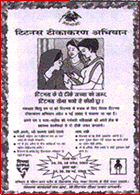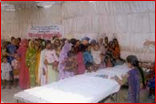Training
Adequate care during pregnancy is imperative for a healthy mother and child and it reduces maternal & neonatal mortality, considerably. However, it is also most neglected as is evident from existing data on maternal & child health (MCH) indicators. Uttar Pradesh contributes to 21% of neonatal deaths in the country. Maternal mortality ratio for U.P. is 707 as compared to 436 for India. Very high neonatal deaths and pregnancy related maternal mortality are causes of deep concern to the Government of Uttar Pradesh. A large proportion of these deaths are due to tetanus.
Maternal and neonatal deaths due to tetanus are preventable if pregnant women are immunized with two doses of tetanus toxoid (TT) vaccine. In spite of efforts undertaken in the past, the coverage level is low. Special drives are therefore necessary to make available TT immunization to all pregnant women in the state.
SIFPSA motivated the U.P. Health and Family Welfare department to organize the first ever TT campaign in 2 phases in May and June, 1999, covering all pregnant women throughout the state. IFA tablets and ORS packets were also distributed to women visiting immunization points in villages. SIFPSA provided technical assistance in the design and planning of the campaign. Survey formats to identify the target group, guidelines and instruments for functionaries at all levels were prepared by SIFPSA alongwith messages and artworks for the campaign publicity.
A quantitative evaluation conducted by an external agency, Population Resource Centre (PRC) Lucknow, showed encouraging results. Pregnant women who had received a single dose of TT increased from 30.5% to 59.3% as a result of the campaign. Those who received two doses increased more than two and half times from 12.9% to 33%. The survey also collected information on other aspects related to the campaign such as source of immunization, reasons for non-immunization, awareness about campaign and source of awareness.
Inspired by this success, the Family Welfare department has decided to conduct the TT campaign for every year upto 2002. This year the campaign has been organized in two phases on April 24, 26 & 28 and on May 24, 26 and 29, 2000. As in the previous campaign, the technical assistance in the design and planning is being given by SIFPSA. The content and focus of the campaign is similar to the first. As survey reports showed that awareness about the campaign was low, the IEC component has been strengthened. Artworks for banners, leaflets, newspaper insertions, wall paintings, radio jingles and audio messages have been developed by SIFPSA. A special awareness campaign was also undertaken in the NGO project areas of 14 districts. Frontline workers in these districts went from door-to-door and held group meetings to generate awareness about the TT campaign. SIFPSA also funded the gap between budget available for the campaign and resources required.
- The campaign will be implemented simultaneously in the entire state
- The auxiliary nurse mid-wifes (ANMs) will visit all villages in their area, to inform and register all pregnant women
- On immunization days in each of the two phases, services will initially be provided at selected sites within the village, after which ANMs will go from door-to-door to immunize pregnant women
- IFA tablets and ORS packets will also be distributed during immunization sessions
- Availability of vaccines, syringes, iron & folic acid (IFA) tablets, oral rehydration salt (ORS) packets and other logistics will be organized centrally by the Directorate of Family Welfare
- State level observers will visit various districts during the campaign for monitoring and feedback
Positive feedback has been received from NGOs after both the rounds. It has been reported that the campaign has been well received in villages. Immunization services have reached even remote villages where no services were provided earlier. Many women who were hitherto ignorant, have now been made aware about the hazards of tetanus and that it can be prevented by vaccination.
An evaluation of this campaign will be carried out every year to assess the measure of its success and give inputs for future planning.
Get in Touch with us
(Uttar Pradesh), INDIA
E-Mail : info@sifpsa.org
Phone :(91 - 0522) 2630902,997,741,896,899,894
Fax :
Site Manage by : MARG Software Solutions
2016 © SIFPSA All Rights Reserved
Number of Visitors



